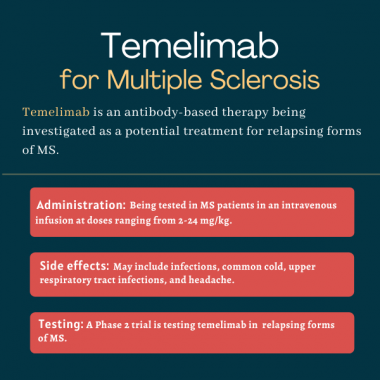
FAQs about temelimab in MS
Temelimab is an experimental antibody therapy that is not yet approved for the treatment of multiple sclerosis (MS). It is designed to block the effects of a viral protein, pHERV-W, which is known to contribute to the damaging immune response in MS. Clinical trials in relapsing forms of the disease have shown a slower brain tissue loss and preserved myelin after temelimab treatment.
It is still too early to know if or when the medication might be approved by the U.S. Food and Drug Administration. Temelimab has shown promising neuroprotective effects in Phase 2 trials involving people with relapsing forms of multiple sclerosis. But an optimal dose for future clinical trials has not yet been determined, and additional studies will be needed before any application for approval can be submitted.
Clinical trials of temelimab have not included people who were pregnant or breastfeeding, and all who had the ability to reproduce were required to use effective methods of contraception. It is not known whether the therapy is safe for such patients.
In the CHANGE-MS clinical trial, a 18 mg/kg dose of temelimab resulted in significant reductions in brain volume loss and in preserved myelin integrity after one year of treatment. However, multiple sclerosis manifests differently in all patients and responses to treatment may vary.
Hair loss and weight gain were not reported as side effects of temelimab in multiple sclerosis clinical trials. Patients who experience unexpected side effects after starting any new treatment are advised to speak with their healthcare providers.
 Fact-checked by
Fact-checked by 


